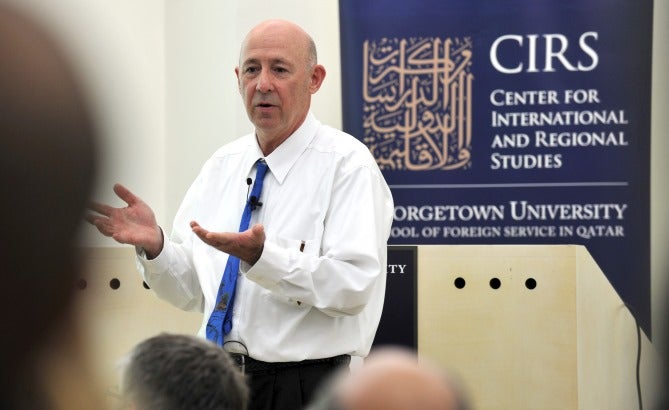CIRS Faculty Lectures, Dialogue Series, Race & Society
Professor Westbrook Lectures on Education and Market Transition in Viet Nam

On August 30, 2010, Daniel Westbrook, an economics professor at the Georgetown University School of Foreign Service in Qatar, delivered the August CIRS Monthly Dialogue lecture on the topic of “Education and Market Transition in Viet Nam.” Westbrook first traveled to Viet Nam in 1993 to spend a semester teaching at the National Economics University in Hanoi under a program sponsored by the Ford Foundation; he returned to the Ford Foundation program during the 1995–1996 academic year. Professor Westbrook also spent a year at the Fulbright Economics Training Program in Ho Chi Minh City during 2001–2002. More recently, he worked on Viet Nam as a “case study for looking at the effects of marketization on returns to education.” This is an ongoing research project that centers on the question: “How has the payoff to education evolved during Viet Nam’s market transition?”
To provide context for his research, Westbrook explained the role of education in the economic development process. “The traditional view of economic development,” he said “describes a process where labor moves from agricultural activities to industrial activities.” Historically, policies based on this view tended to focus on heavy industry. Westbrook also described a more modern definition of economic development which gives a central role to human capital and “acquisition of increasingly sophisticated and productive ways of competing.” This model, he said, “envisions a world where developing countries’ abilities to compete in world markets depend very much on their acquisition of human capital.” Westbrook cited the role education played in producing the rapid economic growth the Asian tiger economies experienced in the latter part of the 20th century.
At the beginning of its transition period, Viet Nam was on the verge of starvation. Even though Viet Nam has enjoyed GDP growth rates of 7–8 % per year for over two decades, it remains very poor and there is much room for economic development to occur. Viet Nam’s education policies have been advancing along ambitious goals to support further development. “In order for people to invest in education,” Professor Westbrook explained, “they have to have an incentive.” It is generally understood that “education gives you access to better jobs and higher wages,” but this assumes the existence of labor markets sophisticated enough to compensate workers for their educational attainments. Viet Nam’s market transition experience provides an opportunity to examine the effect of improving markets on the returns to education. At the beginning of the transition period jobs were administratively allocated and market returns to education were weak. During the late 1980s, Viet Nam began its transition to a market-oriented economy. Professor Westbrook documented the degree to which greater labor market depth generated higher returns to education.
Professor Westbrook’s statistical work indicates that the impact of education in Viet Nam is substantial and significant. Moreover, the impact is larger where labor market depth is greatest. Thus, he concluded, “education pays off in a big way and this indicates a very strong incentive to acquire additional schooling or to invest in the schooling of one’s children.”
Daniel Westbrook received his Ph.D. from The Ohio State University in 1978 and joined the faculty at Georgetown at that time. He joined the School of Foreign Service in Qatar in 2008. His current research interests focus on applied micro-econometrics in economic development and on Vietnam. Professor Westbrook regularly teaches micro-economic principles, international trade, globalization, environmental economics, economic statistics and econometrics.
Article by Suzi Mirgani, CIRS Publications Coordinator.
View the presentation from lecture below:
Education and Economic Transition in Viet Nam 1993 -2006 from Georgetown University School of Foreign Service in Qatar